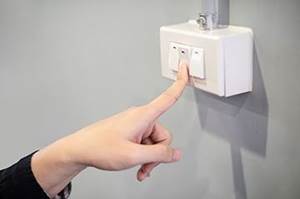Are You Turning the Lights Out on Profitability?
If you are a shop with a lightly attended program or lights out, you need to hear this lesson because it will help you keep your business profitable and not let the market steal your value.

Growing up with a father as a mechanic has a balance of pros and cons. On one hand, having someone in the house who can fix anything with what seemed like a paperclip and pocket lint is handy, but being a mechanic usually requires a lot of time away from home. Having a dad who decided to open his own shop when I was in the 6th grade only added to the amount of time away. However, he was able to give me my first job making real money. It was not my first job ever, but a chance to make a nice amount of money for a kid going into high school.
Working for my dad was tougher than I thought it was going to be. I went from spending evenings with him to spending an extra five hours a day with him. Sometimes we rubbed each other the wrong way, but I would not trade it for the world; he taught me about a strong work ethic. He also gave me the gift of the ability to use my hands and tools in a way that, 15 years later, I still use.
But my greatest lesson from my dad was his understanding of value, and it is a lesson that I took to heart. It was the greatest lesson he taught me. One day I asked him, “Dad, why do you charge two hours of labor for something that only took you 30 minutes?” I remember seeing this many times before I decided to ask that question. If you are a shop with a lightly attended program or lights out, you too need to hear this lesson because it will help you keep your business profitable and not let the market steal your value.
It used to really irritate him when people would wait for their car in the lobby, because he would have to park their car in the bay, even though it was fixed, to give the impression that it was still being fixed. My dad owned a three-bay shop at this point, so he hated not having the bays in actual use at all times. But when a radiator flush on a Ford Taurus calls for two hours of labor (market standard) and, the customer is going to wait, you have to “show” a work time that matches the invoice time. I learned very quickly that this wasn’t a scam. My dad was a great mechanic, and over the years had built up a ton of knowledge and skill that allowed him to perform these jobs much faster and in far less time than “standard.” Capitalizing on this advantage was the main reason he decided to open his own shop.
Here is my dad’s question in response to mine, and I will never forget his response as long as I live: “Why should someone else reap the benefit of billing for two hours for 30 minutes of bay time? I spent almost 30 years learning how to do this two-hour job in 30 minutes, so I am getting paid for value. Damn the time, Joe.” Even in his tired end-of-the-day state, he taught me one of the most valuable lessons I will learn while on this earth—get paid for the years, not minutes. Get paid for the value add. It is none of the customer’s business how the job was done. What is their business is that they are getting the value that they seek. Time on your machines and labor rate and manning per shift is on you. Don’t give away your earned hours from lightly attended operations. It is the wisdom, institutional and tribal knowledge that gives you that advantage. There is no need for you to facilitate a pricing race to the bottom. My dad taught me that the value he adds isn’t measured in hours, it is measured in his knowledge, and ultimately, that is what the customer is buying. This lesson has helped me see that while my wages might have been measured in hours, my production is measured in value.
Don’t sacrifice your shop’s earning power on the altar of time justification. Be confident and invoice-based on the value that you add at the market rate, regardless of the “how.” Invoicing for market value, not hours spent, put food on the table for this son of an entrepreneur. It is certainly applicable when looking at how to invoice for our shops’ lightly attended and lights-out operations. Should you be discounting your labor rates “just because” you have invested in lights out or lightly attended? My dad’s example proved to me that your costs should not drive your price. The value that the customer receives is what they pay for. Why shouldn’t we be paid for working smarter, not harder? Why should we discount our revenue just because we are working smarter than others?
Thanks, Dad. Your lesson on value still resonates with me to this day.
About the Author
Joe Jackson is a recent hire of Gardner Business Media. Email: jjackson@pmpa.org.
Related Content
Tips for Troubleshooting and Repairing Chip Conveyors
A nonfunctioning chip conveyor can cause a high-production machine to be down for an extended period of time. Here is some troubleshooting advice if you’re having issues with your chip conveyors.
Read More4 Bright Ideas for Effective Lights-Out Machining
Adopting lights-out machining involves considerations when a machine shop decides to move forward with the process. Here are some tips to a successful implementation.
Read MoreReplace Repetitive Measurement With DIY Robotic Automation
After minimal training, a shop can learn how to use this robotic inspection system configured for a shopfloor application to supersede repetitive, time-consuming, high-mix gaging processes. It can then be redeployed for another application somewhere else in the facility.
Read MoreJob Shop Discovers and Fills a Fishing Need
The promise of a product line for improved mounting of electronic fish finders led this Missouri job shop to an automated turning process.
Read MoreRead Next
Do You Have Single Points of Failure?
Plans need to be in place before a catastrophic event occurs.
Read MoreA Tooling Workshop Worth a Visit
Marubeni Citizen-Cincom’s tooling and accessory workshop offers a chance to learn more about ancillary devices that can boost machining efficiency and capability.
Read More5 Aspects of PMTS I Appreciate
The three-day edition of the 2025 Precision Machining Technology Show kicks off at the start of April. I’ll be there, and here are some reasons why.
Read More







.jpg;maxWidth=300;quality=90)













